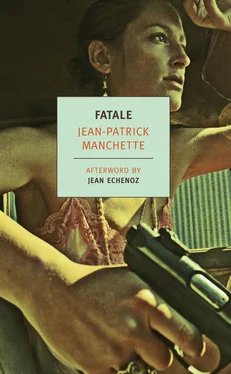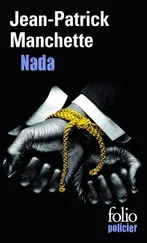Jean-Patrick Manchette - Fatale
Здесь есть возможность читать онлайн «Jean-Patrick Manchette - Fatale» весь текст электронной книги совершенно бесплатно (целиком полную версию без сокращений). В некоторых случаях можно слушать аудио, скачать через торрент в формате fb2 и присутствует краткое содержание. Год выпуска: 2011, ISBN: 2011, Издательство: New York Review Books, Жанр: Криминальный детектив, на английском языке. Описание произведения, (предисловие) а так же отзывы посетителей доступны на портале библиотеки ЛибКат.
- Название:Fatale
- Автор:
- Издательство:New York Review Books
- Жанр:
- Год:2011
- ISBN:978-1-59017-572-9
- Рейтинг книги:5 / 5. Голосов: 1
-
Избранное:Добавить в избранное
- Отзывы:
-
Ваша оценка:
- 100
- 1
- 2
- 3
- 4
- 5
Fatale: краткое содержание, описание и аннотация
Предлагаем к чтению аннотацию, описание, краткое содержание или предисловие (зависит от того, что написал сам автор книги «Fatale»). Если вы не нашли необходимую информацию о книге — напишите в комментариях, мы постараемся отыскать её.
Fatale — читать онлайн бесплатно полную книгу (весь текст) целиком
Ниже представлен текст книги, разбитый по страницам. Система сохранения места последней прочитанной страницы, позволяет с удобством читать онлайн бесплатно книгу «Fatale», без необходимости каждый раз заново искать на чём Вы остановились. Поставьте закладку, и сможете в любой момент перейти на страницу, на которой закончили чтение.
Интервал:
Закладка:
“Didn’t I tell you I was an astronomer?” the baron cried triumphantly. Although they had climbed the staircase quickly, he was not out of breath. Nor was Aimée.
There were apertures in the roof, mirrors, a variety of glasses and telescopes, and, strewn on rolling enameled tables reminiscent of those used in hospitals, papers covered with notations in very tiny but very legible handwriting. So far as Aimée could tell, these were calculations and vaguely poetic thoughts on celestial bodies. Through a stained-glass window the blue-tinged rooftops of Bléville could be seen several kilometers away.
“It’s a fine pastime, astronomy,” said the baron, as he adjusted a telescope mounted at an almost vertical angle and pointing at an opening in the roof, a kind of skylight. “It’s a fine pastime that harms no one and corresponds to my social rank and tastes. I love to observe.” He looked at Aimée, who did not respond. He turned away and abruptly slapped the telescope down into a horizontal position. “Not just the stars, though-fine gentlemen too!” he cried. “Bléville is also worth observing. Not with this instrument, of course. But through cracks in the walls, through the chinks in people themselves, through keyholes.” The baron turned away from the stained-glass window. “I have been watching this town for dozens of years,” he explained. “I know everything there is to know about it.” His expression was now frozen, empty. Muscles pulled his lips taut against his teeth. “So just fight bravely on, most gracious masters of capital!..you shall be allowed to rule for a short time. You shall be allowed to dictate your laws, to bask in the rays of the majesty you have created, to spread your banquets in the halls of kings, and to take the beautiful princess to wife-but do not forget that ‘Before the door stands the headsman!’”
“What are you talking about?” demanded Aimée.
A little later, a little calmer now, as the pair went back down into the hall (on a wall of which hung a Weatherby Regency under-and-over double-barrel shotgun), Baron Jules further informed Aimée that, although the movements of men are not analogous to the movements of the stars, it sometimes seemed to him that they were, this on account of the posture that he had adopted, or rather that he had been obliged to adopt. These strange remarks made Aimée a little nervous, and she wanted to get away from this place. It was not long before the baron drove her back to Bléville. Yet when he left in his banged-up old 4CV, Aimée was sorry.
10
One or two minutes after alighting from Baron Jules’s 4CV in front of the Seagull Apartments, Aimée was opening the door of her studio when she heard a kind of strangled groan which made her shudder. Standing before her half-open door, she quickly turned her head. Some way down the corridor, another door was ajar. In the opening a little old lady could be seen. Aimée shook her head in irritation. Twice or three times a week she had noticed the old lady spying on her as she passed. She was an especially repulsive old woman by Aimée’s lights, with her pendulous cheeks caked with white face powder and her purplish lipstick. This time, though, she seemed to be trying to address the young woman. Clutching the doorframe with one hand, she cleared her throat in a disgusting way. Aimée opened the door to her studio wide, went in, and slammed it behind her.
She put her bag down on a chair and went over to hang her woolen jacket in the armoire. Rustling sounds came from down the corridor, and then from right outside her apartment; a scratching noise seemed to emanate from the crack beneath the door, followed by snorts, a belch, and a cough. Aimée went back to the door and opened it in exasperation.
“What the hell do you want?” she demanded.
Only then did she see the old woman, silent now, lying on her stomach just outside her door, her face in a pool of vomit. Aimée grimaced in disgust. After a moment of hesitation, she went down on one knee and felt for the little old lady’s pulse. She found none. With the tip of a fingernail she pulled back one of the woman’s eyelids in search of some retinal reflex. Then she stood up, and, leaving the door open, went and picked up the telephone receiver and made an emergency call. Six or seven minutes later a police car and an ambulance pulled up in front of the building. Shortly thereafter, Police Commissioner Fellouque’s personal car also drew up. A bald-headed doctor of about fifty, whom Aimée did not know, examined the old woman. She was dead. They took her away on a stretcher.
“She must have dragged herself along to your room to ask for help,” said Commissioner Fellouque. Tall and dark, with a light mustache and dazzling white teeth, Fellouque was the cop whom Aimée had seen tossing Baron Jules out of Lorque’s house. The young woman now poured him a cup of tea that she had just made. “Then,” he went on, “she turned around intending to go back to her room and phone. Which is what she should have done in the first place. I doubt it would have made much difference though.”
“Commissioner, is something unusual going on?” asked Aimée.
“What do you mean? What do you mean, something unusual?”
“Well, you are the commissioner, and you have taken the trouble to come out here,” said Aimée. “The emergency services could have handled this. But perhaps…” She hesitated. “I saw a baby die in the same kind of way early this afternoon.”
The commissioner rose from the bed, where he had sat down without being invited. He began gesturing with both arms and hunched his head back into his shoulders.
“I don’t want people going crazy and spreading wild rumors!” he cried. “There’s some kind of food poisoning going around, that’s all.” He dropped his arms and suddenly seemed calm and disdainful. “I have another dead person on my hands, the third, and there are a dozen or so people in the hospital, if you must know. I want no panic. You’re not going to get on the phone, I hope?”
“The phone?”
“Yes, yes,” said the commissioner. “You know how you women are amongst yourselves.”
Aimée and the policeman looked wordlessly at each other for a moment. Fellouque seemed suspicious and exasperated. Aimée’s attitude was contemptuous.
“Do you have any canned goods here?” asked the commissioner. The door to the studio, which had been pushed shut, was now opened wide by someone who was simultaneously knocking on it. “Ah, not you!” cried the commissioner. “Get the hell out of here! Leave us be!”
“This is a private residence,” observed the intruder, a small man in his fifties with blue eyes and iron-gray hair as spiky as a bird’s nest. He was wearing a long, beat-up leather jacket. “You have no right to kick me out, Fellouque,” he added, turning to Aimée. “Press, my dear little lady. DiBona, Dépêche de Bléville . Might I speak with you?”
“You can not! You can not!” said Commissioner Fellouque, attempting to bar the fifty-year-old’s way as he moved smiling towards Aimée.
“Lorque and Lenverguez are busy poisoning half the town, my dear madame,” said DiBona. “We have cattle dying too. I must appeal to your public spirit. Don’t tell me you are going to let this cop cover it all up?”
“It’s not about covering anything up!” exclaimed Fellouque. “Malice is leading you astray, DiBona. You are raving.” He turned to Aimée. “He is raving!”
“He wants to cover it up!” insisted DiBona.
“People are waiting for me to play bridge, gentlemen,” said Aimée. “You must excuse me.”
It took her a few minutes to get rid of the two men, but eventually Aimée found herself on her bicycle in the streets of Bléville. Her appointment was at five o’clock at the Moutets, for tea and a rubber of bridge with the couple and Sonia Lorque. She was not quite sure, in point of fact, considering the baby’s death and the other alarms, that the game would take place. But she smiled as she pedaled. She liked crises.
Читать дальшеИнтервал:
Закладка:
Похожие книги на «Fatale»
Представляем Вашему вниманию похожие книги на «Fatale» списком для выбора. Мы отобрали схожую по названию и смыслу литературу в надежде предоставить читателям больше вариантов отыскать новые, интересные, ещё непрочитанные произведения.
Обсуждение, отзывы о книге «Fatale» и просто собственные мнения читателей. Оставьте ваши комментарии, напишите, что Вы думаете о произведении, его смысле или главных героях. Укажите что конкретно понравилось, а что нет, и почему Вы так считаете.












